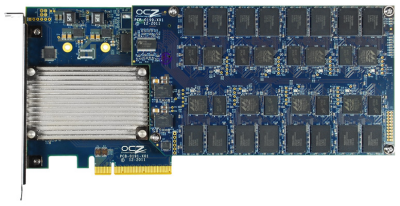OCZ Technology Group, Inc., a leading provider of high-performance solid-state drives (SSDs), today announces the debut of new and exciting SSD solutions. Using the world's most popular technology tradeshow as a platform, OCZ's latest SSDs demonstrate a commitment to advancing flash storage technology into greater realms of performance and versatility, further driving adoption in client and enterprise applications.

"CES represents a great opportunity for us to showcase our latest storage technology, and highlight next generation cloud-optimized solid state solutions that address today's enterprise needs," said Ryan Petersen, CEO of OCZ Technology. "Once again we have been able to leverage our increased R&D strength and our understanding of client needs to change the face of solid state storage and deliver innovative new solutions far ahead of our competitors, demonstrating technology leadership across all product categories."
OCZ will introduce next generation solutions designed to deliver higher performance, reliability, and storage capacity to meet the demands of the enterprise market with industry-leading products. OCZ products to be unveiled at CES include:
Z-Drive R5 – Utilizing the OCZ and Marvell co-developed Kilimanjaro platform, the fifth generation Z-Drive R5 is designed to accelerate "big data" like never before. As the world's first PCIe x16 Gen 3 SSD, which supports up to 16GB/s of total bandwidth, the R5 will be 2012's most advanced SSD, featuring performance that reaches up to an incredible 2.52 million IOPS and 7.2GB/s sequential transfers per card, with unlimited scalability and performance aggregation capability. With optional power fail protection the R5 will be available in a range of form factors including full height, half height, and 2.5-inch PCIe. The R5's industry-leading performance and storage capacities make pure flash storage in mission-critical applications possible.

Indilinx Everest 2 – The SATA 3.0-based third generation Indilinx controller is designed specifically for I/O-intensive workloads in a wide range of applications, supporting sequential speeds of up to 550MB/s, and up to 105,000 random read and 90,000 Random Write IOPS with the newest 2xnm flash technology. The Everest 2 platform supports up to 2TB capacity in a compact 2.5-inch form factor.
Z-Drive R4 CloudServ RM1616 – Making 16TB of storage on a single PCIe card a reality, the new Z-Drive R4 CloudServ RM1616 is the newest addition to the award-winning R4 Series. With performance of up to 6.5GB/s and over 1.4 million IOPS, the Z-Drive R4 CloudServ's level of concentrated performance and capacity enables system architects to design more productive infrastructures while lowering operating costs associated with hard drive technology.
Chiron 4TB SSD – The world's fastest and highest capacity SATA SSD for the enterprise, the Chiron Series provides a staggering 4TB in a compact 3.5-inch form factor. With performance exceeding SATA 3.0 bus capabilities, Chiron delivers speeds above 560MB/s and 100,000 IOPS. Eliminating the need for high capacity HDDs as anything other than backup devices, the Chiron Series enables mass SSD storage and is capable of deploying up to 96TB of storage in a 4U rackmount server chassis.

OCZ's enterprise showcase demonstrations will include, among others, an IBM System x3650 M3 highlighting the performance potential of the new Z-Drive R5 PCIe Gen 3 in a Linux server environment, as well as a HP ProLiant DL370 G6 server equipped with two Z-Drive R4 RM1616s delivering 1,400,000 IOPS per card with Windows Server 2008. In addition, drives based on the next-generation Indilinx Everest 2 platform will be demonstrated, as well as a prototype of "Lightfoot," an external Intel Thunderbolt™ SSD unveiling a new generation of high-performance portable storage.
Join OCZ Technology Group at the International CES event as we highlight the many advantages of SSDs over traditional hard disc drives for OEMs, enterprise clients, and enthusiast consumers who place a premium on performance, reliability, and total cost of ownership (TCO).

